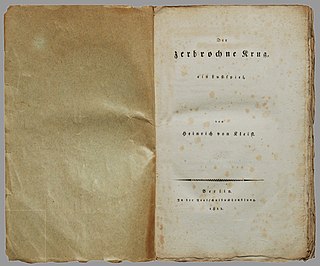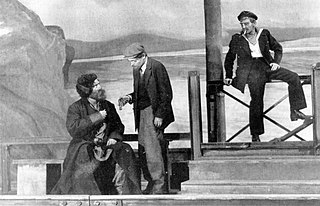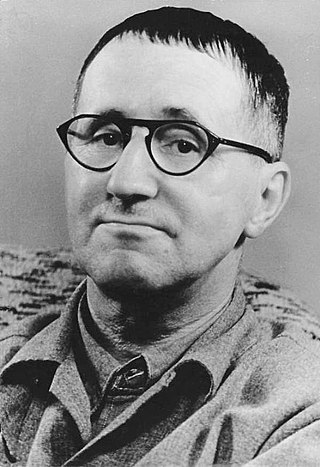Related Research Articles

Expressionism is a modernist movement, initially in poetry and painting, originating in Northern Europe around the beginning of the 20th century. Its typical trait is to present the world solely from a subjective perspective, distorting it radically for emotional effect in order to evoke moods or ideas. Expressionist artists have sought to express the meaning of emotional experience rather than physical reality.

August Robert Ludwig Macke was a German Expressionist painter. He was one of the leading members of the German Expressionist group Der Blaue Reiter. He lived during a particularly active time for German art: he saw the development of the main German Expressionist movements as well as the arrival of the successive avant-garde movements which were forming in the rest of Europe. As an artist of his time, Macke knew how to integrate into his painting the elements of the avant-garde which most interested him. Like his friend Franz Marc and Otto Soltau, he was one of the young German artists who died in the First World War.

Ernst Heinrich Barlach was a German expressionist sculptor, medallist, printmaker and writer. Although he was a supporter of the war in the years leading to World War I, his participation in the war made him change his position, and he is mostly known for his sculptures protesting against the war. This created many conflicts during the rise of the Nazi Party, when most of his works were confiscated as degenerate art. Stylistically, his literary and artistic work would fall between the categories of twentieth-century Realism and Expressionism.

Walter Georg Alfred Hasenclever was a German Expressionist poet and playwright. His works were banned when the Nazis came to power and he went into exile in France. There he was imprisoned as a "foreign enemy". He died in Les Milles near Aix-en-Provence.

Ernst Deutsch, also known as Ernest Dorian, was a Jewish Austrian actor. In 1916, his performance as the protagonist in the world première of Walter Hasenclever's Expressionist play The Son in Dresden was praised. Deutsch also played the antihero Famulus in Paul Wegener's The Golem: How He Came into the World in 1920. He is known by English-speaking audiences for his role as Baron Kurtz in Carol Reed's 1949 film noir, The Third Man.

Friedrich Carl Georg Kaiser, called Georg Kaiser, was a German dramatist.

The Deutsches Theater is a theater in Berlin, Germany. It was built in 1850 as Friedrich-Wilhelm-Städtisches Theater, after Frederick William IV of Prussia. Located on Schumann Street (Schumannstraße), the Deutsches Theater consists of two adjoining stages that share a common, classical facade. The main stage was built in 1850, originally for operettas.

Expressionism was a movement in drama and theatre that principally developed in Germany in the early decades of the 20th century. It was then popularized in the United States, Spain, China, the U.K., and all around the world. Similar to the broader movement of Expressionism in the arts, Expressionist theatre utilized theatrical elements and scenery with exaggeration and distortion to deliver strong feelings and ideas to audiences.

The Broken Jug is a comedy written by the German playwright Heinrich von Kleist. Kleist first conceived the idea for the play in 1801, upon looking at a copper engraving in Heinrich Zschokke's house entitled "Le juge, ou la cruche cassée". In 1803, challenged over his ability to write comedy, Kleist dictated the first three scenes of the play, though it was not completed until 1806. Johann Wolfgang von Goethe first staged the play in Weimar, where it premiered on 2 March 1808.
Hans Henny Jahnn was a German playwright, novelist, and organ-builder.
Arnolt Bronnen was an Austrian playwright and director.

Murderer, the Hope of Women is a short Expressionist play written by the painter Oskar Kokoschka. It focuses more on the actions and appearances of its characters than on their dialogue. Its performance was received with much criticism, as it was a break from classical drama and part of the modernist avant-garde movement in German culture.

Drama is the specific mode of fiction represented in performance: a play, opera, mime, ballet, etc., performed in a theatre, or on radio or television. Considered as a genre of poetry in general, the dramatic mode has been contrasted with the epic and the lyrical modes ever since Aristotle's Poetics —the earliest work of dramatic theory.
Teo Otto (1904–1968) was a Swiss stage designer. He trained in Kassel and Paris and in 1926 taught at the Bauhaus in Weimar. In 1928 he became an assistant at the Berlin Staatsoper. Following the Nazis' seizure of power in Germany, he returned to Switzerland where he was resident designer at the Zürich Schauspielhaus for 25 years.

The League for Proletarian Culture was a short-lived German left-wing organisation for the promotion of proletarian culture. It was founded in Berlin in spring 1919 by Alfons Goldschmidt, Arthur Holitscher, and Ludwig Rubiner and was dissolved in early 1920. It sought to promote "the eternal values bequeathed by the illustrious spirits of the past."

Armoured Train 14–69 is a 1927 Soviet play by Vsevolod Ivanov. Based on his 1922 novel of the same name, it was the first play that he wrote and remains his most important. In creating his adaptation, Ivanov transformed the passive protagonist of his novel into an active exponent of proletarian ideals; the play charts his journey from political indifference to Bolshevik heroism. Set in Eastern Siberia during the Civil War, it dramatises the capture of ammunition from a counter-revolutionary armoured train by a group of partisans led by a peasant farmer, Nikolai Vershinin. It is a four-act play in eight scenes that features almost 50 characters; crowd scenes form a prominent part of its episodic dramatic structure. Near the end of the play a Chinese revolutionary, Hsing Ping-wu, lies down on the railway tracks to force the armoured train to stop.

Eugen Berthold Friedrich Brecht, known professionally as Bertolt Brecht, was a German theatre practitioner, playwright, and poet. Coming of age during the Weimar Republic, he had his first successes as a playwright in Munich and moved to Berlin in 1924, where he wrote The Threepenny Opera with Kurt Weill and began a life-long collaboration with the composer Hanns Eisler. Immersed in Marxist thought during this period, he wrote didactic Lehrstücke and became a leading theoretician of epic theatre and the Verfremdungseffekt.

"Heut triumphieret Gottes Sohn" is a Lutheran hymn for Easter. Kaspar Stolzhagen published the hymn in 1592, and its setting by Bartholomäus Gesius was published in 1601. The hymn was adopted in several hymnals, including the Evangelisches Gesangbuch. Composers such as Johann Sebastian Bach based compositions on its hymn tune.

Carl Ernst "Karli" Sohn-Rethel German Modernist painter of the Düsseldorf school of painting art movement. He traveled often and was active in Düsseldorf, Munich, Rome, Positano, Paris, among other places. Sohn-Rethel was a member of the art groups, Sonderbund group and Young Rhineland.
References
- ↑ Marx (1997) and Rorrison (1998, 475).
- ↑ Kuhns (1997, 23, 96), Rorrison (1998, 475), and Wellwarth (2002, 258).
- ↑ Rorrison (1998, 475) and Schürer (1997b, xiii).
- ↑ Schürer (1997b, xiv).
- ↑ Kuhns (1997, 61, 94), Rorrison (1998, 475), Schürer (1997b, ix, xiv), and Wellwarth (2002, 258).
- ↑ Kuhns (1997, 89) and Schürer (1997b, xiv-xv).
- ↑ Kuhns (1997, 36).
- Sources
- Banham, Martin, ed. 1998. The Cambridge Guide to Theatre. Cambridge: Cambridge University Press. ISBN 0-521-43437-8.
- Hasenclever, Walter. 1994. Der Sohn. Ein Drama in fünf Akten. Nachw. v. Michael Schulz. Stuttgart: Reclam. ISBN 3-15-008978-6.
- Kuhns, David F. 1997. German Expressionist Theatre: The Actor and the Stage. New ed. Cambridge: Cambridge UP, 2006. ISBN 978-0-521-03522-4.
- Marx, Henry, trans. 1997. The Son. By Walter Hasenclever. In Schürer (1997a, 82-145).
- Rorrison, Hugh. 1998. "Hasenclever, Walter." In Banham (1998, 475).
- Schürer, Ernst, ed. 1997a. German Expressionist Plays. The German Library ser. vol. 66. New York: Continuum. ISBN 978-0-8264-0950-8.
- ---. 1997b. Introduction. In Schürer (1997a, vii-xxi).
- Wellwarth, George E. 2002. "Expressionism." In The Reader's Encyclopedia of World Drama. Ed. John Gassner and Edward Quinn. Mineola, NY: Dover. 256-261. ISBN 978-0-486-42064-6.